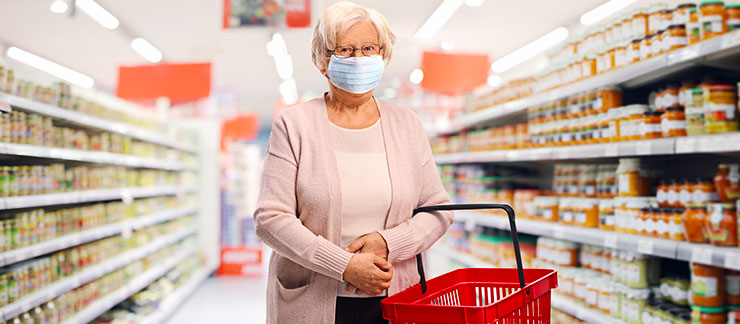
6 Safety Tips for Seniors and Caregivers During COVID-19 Reopening
Communities across the country are beginning to reopen after the initial surge of COVID-19, and many people are welcoming the opportunity to dine at a restaurant, get a haircut, or visit with family. However, due to their increased risk of coronavirus-related complications, some seniors — as well as their family caregivers — may be understandably concerned about resuming activities in public.
Here are six safety tips seniors and caregivers can keep in mind during reopening:
- Understand your risks
- Follow public health guidelines
- Carefully consider expanding your “quarantine bubble”
- Establish safety rules at home
- Continue to use drive-thru, delivery, and virtual services
- Care for your mental health
Although it may sound scary, it’s important to know any activities you engage in outside of your home will come with some level of COVID-19 infection risk. While it may be safest for seniors and their caregivers to stay home, it may not be practical in the long-term. The key to staying safe is to understand your risk factors, the level of COVID-19 infection risk in your community, and your comfort level.
If you care for an older loved one and your community is experiencing a high number of COVID-19 infections, hold off on resuming certain activities — such as visiting family, running unnecessary errands, or dining at a restaurant — for a few weeks, just to see how reopening goes. You may decide that it’s safest for you to continue staying home as much as possible if your older loved one has a health condition that could raise their risk of COVID complications, or if you or your loved one feels anxious about reopening.
If you have specific questions about your level of risk in certain situations, reach out to your healthcare provider for advice.
Monitor public health guidelines in your area and follow all recommendations designed to keep community members safe. These recommendations may include wearing a face covering, practicing social distancing, washing hands, avoiding crowds, and limiting the size of gatherings. Your state department of health is an excellent place for reliable information. Also, check with the guidelines and timelines put forth by the Centers for Disease Control and Prevention (CDC).
Now that restrictions have eased, it may be tempting to invite all of your friends and family members over for a visit. However, you should continue to be careful about who you let into your “quarantine bubble.”
Before you gather with family or friends, consider who those people have been in contact with in the past few weeks. If you and your family or friend have each been observing strict quarantine, the risk of exposure to COVID-19 is low. But the more people your friend or family member has been exposed to, the higher the risk for you. It’s also important to reassess the risks of COVID-19 exposure before each meeting.
If you choose to expand your quarantine bubble, you should establish and stick to a set of safety rules to protect your loved one from the coronavirus. Generally, outdoor visits where social distancing can be maintained are safest. Sharing food or other items will increase the level of risk.
If you allow visitors into your home, consider asking them to take off their shoes, wash hands, social distance, and wear a face covering. You may also want to consider doing extra cleaning after your guest leaves, such as wiping down bathroom fixtures, doorknobs, refrigerator handles, light switches, or other areas they may have touched.
If your older loved one receives personal care services from an in-home caregiver, consider asking his or her caregiver to take extra precautions such as more frequent cleaning, limiting errands, and increased hand hygiene. Your loved one’s caregiver also should be self-monitoring for signs of COVID-19 and should seek medical care if he or she notices any concerning symptoms.
As much as possible, continue using drive-thru, delivery, and virtual services for essentials such as groceries, takeout, prescriptions, medical visits, and keeping in touch while maintaining social distancing. Although you will still have to leave home from time to time, using these services can reduce the amount of exposure you have to others and lower your risk of catching COVID-19.
It is certainly reasonable for seniors and their family caregivers to experience some anxiety related to reopening. In contrast, some older adults may experience difficulty coping with prolonged isolation during the COVID-19 pandemic. If you or your loved one is showing symptoms of anxiety or depression, you should contact a healthcare provider.
As our country copes with COVID-19 and starts the process of recovery, older adults and their caregivers should continue to assess changing conditions and risk factors — and seek advice from a trusted healthcare provider if necessary — to determine which activities are safe.


